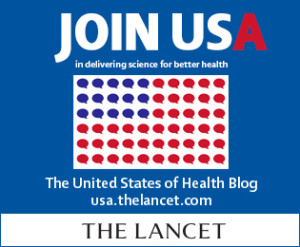 It’s Independence Day week in America, and our British friends at The Lancet, the UK’s grand peer reviewed medical journal, dedicate this week’s issue to the Health of Americans – exploring life, death (mortality), health costs, chronic disease, and the Pursuit of Healthiness.
It’s Independence Day week in America, and our British friends at The Lancet, the UK’s grand peer reviewed medical journal, dedicate this week’s issue to the Health of Americans – exploring life, death (mortality), health costs, chronic disease, and the Pursuit of Healthiness.
This project is a joint venture between The Lancet and the U.S. Centers for Disease Control (CDC) which took 18 months to foster, called The
Health of Americans Series.
Americans mostly die from chronic diseases, aka non-communicable diseases, which are largely amenable to lifestyle changes like eating right, quitting smoking, drinking alcohol in moderation, and moving around more. 1 in 2 U.S. adults have at least one chronic condition, and 1 in 4 have at least 2. High blood pressure and high cholesterol contribute to these chronic disease health risks.
On smoking, among the most significant health risks for most chronic diseases, the Lancet cites the 2014 U.S. Surgeon General’s
report which concluded that changes in the design of cigarettes since the 1950s have increased smokers’ risk of developing lung cancer and chronic obstructive pulmonary disease. “The relative risk of dying from cigarette smoking is now greater than 50 years ago
in the USA,” Lancet says.
In addition to dying from chronic disease, deaths due to accidents, injuries and violence kill 180,000 Americans every year. Car crashes, drug overdoses, gunshot wounds, assaults and self-harm are the #1 cause of death for people in the first three decades of their lives in America.
 Health Populi’s Hot Points: Public health means “public” health: we are the United States. As an example of a commercial company thinking about its role in public health, note that this week, Target asked retail customers to leave firearms at home. The company wrote on its website, “This is a complicated issue, but it boils down to a simple belief: Bringing firearms to Target creates an environment that is at odds with the family-friendly shopping and work experience we strive to create.”
Health Populi’s Hot Points: Public health means “public” health: we are the United States. As an example of a commercial company thinking about its role in public health, note that this week, Target asked retail customers to leave firearms at home. The company wrote on its website, “This is a complicated issue, but it boils down to a simple belief: Bringing firearms to Target creates an environment that is at odds with the family-friendly shopping and work experience we strive to create.”
The pursuit of healthiness is a sine qua non to the Pursuit of Happiness, a core American value. While “health” is not explicitly named in the nation’s Declaration of Independence, the Founding Fathers were united in their passion for civil liberties and individuals’ rights and responsibilities.
 As a nation, Americans face a lagging economy and lagging public health outcomes. More money per person is spent in the country than anywhere on Planet Earth, with very poor returns on that investment. Yet we are blessed with the resources to turn this around – especially for ourselves, with our families, in our communities, and inspiring our social networks (offline and online alike). Our connectedness as Americans can work for us, not just against us. As smokers generally know people who smoke within a few degrees of separation, so too do healthy folk inspire healthy behaviors in their social circles, and so on, fanning out to circles beyond their immediate neighborhood. THINK: The Kevin Bacon Game and, statistically, about Nick Christakis’s research at Harvard explained in Connected.
As a nation, Americans face a lagging economy and lagging public health outcomes. More money per person is spent in the country than anywhere on Planet Earth, with very poor returns on that investment. Yet we are blessed with the resources to turn this around – especially for ourselves, with our families, in our communities, and inspiring our social networks (offline and online alike). Our connectedness as Americans can work for us, not just against us. As smokers generally know people who smoke within a few degrees of separation, so too do healthy folk inspire healthy behaviors in their social circles, and so on, fanning out to circles beyond their immediate neighborhood. THINK: The Kevin Bacon Game and, statistically, about Nick Christakis’s research at Harvard explained in Connected.
This weekend when you’re reaching for the next beer, the next helping of mayo-infused potato salad, a cigarette, or using the TV remote just a bit too much, switch to some lovely ice cold water, a bowl of glorious raspberries and blueberries, some chewing gum, and a great walk around the block and a game of catch with your cousin’s kid. Socially connect, inspire, act healthy, get healthy, be happy. And you’ll also do your part to bend the nation’s health care cost curve (and perhaps even your own out-of-pocket costs).




 I love sharing perspectives on what's shaping the future of health care, and appreciate the opportunity to be collaborating once again with Duke Corporate Education and a global client on 6th May. We'll be addressing some key pillars to consider in scenario planning such as growing consumerism in health care, technology (from AI to telehealth), climate change, and trust -- the key enabler for health engagement or dis-engagement and mis-information. I'm grateful to be affiliated with the corporate education provider
I love sharing perspectives on what's shaping the future of health care, and appreciate the opportunity to be collaborating once again with Duke Corporate Education and a global client on 6th May. We'll be addressing some key pillars to consider in scenario planning such as growing consumerism in health care, technology (from AI to telehealth), climate change, and trust -- the key enabler for health engagement or dis-engagement and mis-information. I'm grateful to be affiliated with the corporate education provider  Thank you FeedSpot for
Thank you FeedSpot for